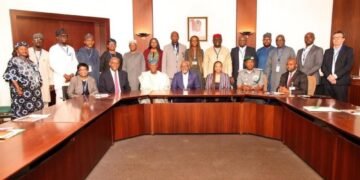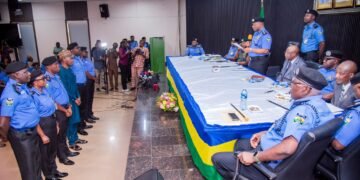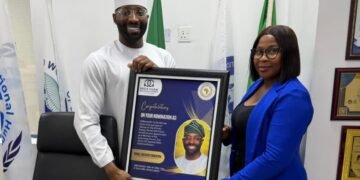Government at all levels have been urged to always ensure implementation and application of results of researches in Nigerian Universities and research institutes so as to engender national development.
This was part of the communique issued at the end of the just concluded 60th meeting of the Committee of Provosts and Deans of Postgraduate Colleges and Schools (CPDPGCS) in Nigerian universities, held at the Ladoke Akintola University of Technology (LAUTECH), Ogbomoso, Oyo state.
The meeting, which had as theme, “Nigerian postgraduate education and the challenges of sustainable development,” and former Vice Chancellor of University of Ibadan (U.I.), Professor Olufemi Bamiro as keynote address speaker, noted that there was need to give consideration to what he called the triple helical structure of academic-government-industry, emphasizing that governments needed to do more in ensuring that results of researches are adequately obtained and applied by industries to solve societal problems so as to engender national development.
In the communiqué issued at the end of the meeting, read by the outgoing Chairman, Professor Jonathan Oyebamiji Babalola, who is the Provost, Postgraduate College, U.I., in the company of Professor Philomina Igbokwe, Provost of Postgraduate College, Nnamdi Azikwe University, Awka, Anambra State and who is the incoming President; and Professor Chiedu Mafiana, Dean of School of Postgraduate Studies, National Open University of Nigeria, Abuja, who is Honorary Secretary of the association, it is stated, “To achieve research goals, the triple helix (TH) model should be inculcated and adopted by collaborative efforts of the government, industries and academia to provide the enabling environments and funds for postgraduate research and development.”
It adds, “In order to solve the challenges posed by ineffective research output, scientific and technical proficiency amongst professionals should be intensified by identifying opportunities arising from innovation and scientific discoveries in such areas as science, trade and resource management and put them into practice.”
Also charging both the National Universities Commission (NUC) and Tertiary Education Fund (TETFund) to be alive to their responsibilities of providing enabling environments for postgraduate training and research, the body urged TETFund to “institute innovation fund in addition to the various research grants on ground now”. This innovation fund should be available to take research through the development to application/commercialization stage to complete the R-D-A trajectory.”
Furthermore, the body advocates a restructuring of the curriculum of postgraduate studies to “promote critical and innovative thinking rather than being a mere tool for degree acquisition,” adding, “This will engender training of researchers who are competent to solve societal needs, as envisaged by the global sustainable development goals (SDGs).”
There was also a recommendation for universities to adopt “problem solving instruction models in postgraduate training” to encourage information analysis by students for them to be able to form their own perspectives just as it harps on allowing students to determine their own research topics rather than their supervisors to stir their creativity.
In another development, CPDPGCS frowns at the increasing wave of what it described as “knowledge theft” in the ivory towers enjoining universities’ authorities to curb the menace with measures such as activation of plagiarism checker, quality assurance mechanism etc.
“Universities should ensure that postgraduate research reports (theses) are uploaded online (into the University repository) to reduce or curb the incidences of plagiarism.
“For the assurance of the quality of postgraduate research, every university should have a quality assurance operational manual apart from the postgraduate manual. It is thus imperative they have research management office.”
While also calling for strengthening of the system of committee of supervision for postgraduate students especially PhD students, it emphasizes strict adherence to NUC recommended carrying capacity for students’ supervision.
Another issue raised by the body is in the area of intrusion of professional bodies into issues that are purely academic. It notes, “Professional fellowships are needed to enhance professional efficiency while PhD is needed for lecturing in the university.
“The fellowship of any profession is a professional qualification and not a university academic degree. Therefore, medical doctors in academics should still be encouraged to take a PhD for their academic career progression. No university should equate a professional fellowship with a Ph.D.”
Answering questions from newsmen on the contracting of theses or stealing of intellectual properties, Professor Babalola said, “We discourage people from buying theses. People do contract thesis out. This association in strong terms condemns this, which is now becoming very prominent in the Nigerian system; it was not known to our culture before. We condemn in strong terms lecturers who do the work of their students for them or finding contractors for their students. We have suggested many ways by which this can be curbed, these include the use of plagiarism checkers and establishment of Doctoral Academy of Nigeria (DAN).”
On solving the problem of lack of synergy between researchers and industrialists, Professor Babalola noted, “You know three groups are involved – you have the academics, we have government, and we have industry. I think the group that can actually make this to be effective will be the government. Just like government did when ASUU (Academic Staff Union of Universities) came up with plans, it says let industries pay tax – and you have TETFund and what TETFund has done to our educational system today you cannot quantify.
“Without TETFund I want to say many universities will have been nothing. I recently got to one university, all the buildings there they are TETFund buildings. That is one innovation that government did. Our call will be government should liaise with industries and ask them to get their solutions from within the country.
“And that will be a great challenge to researchers within the country to wake up to their call because any researcher, any lecturer in Nigerian universities have three works to do, to teach, to do research and do what we call community service. So, it is a three-fold thing each person has a role to play but government is in the best position to start off the collaboration, by coming up with policies that will make industries to liaise with researchers.”













